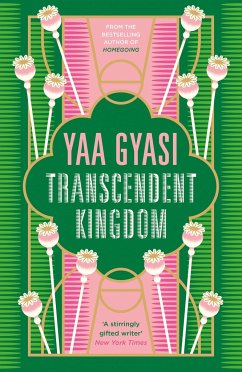
Transcendent Kingdom
Addiction and family, religion and science, being Ghanaian in Alabama: these are some of the issues that Yaa Gyasi’a second novel Transcendent Kingdom confronts. Written from the perspective of Gifty, now a talented biomedical researcher at a prestigious US university, this is the story of the loss of a charismatic brother to opioid addiction, and the complex aftermath of this trauma for those he leaves behind.
Gifty’s story takes readers from Ghana to the US, where her mother believes she will be able to offer her golden boy first child, Nana, a better life. The father, happier in his home country and sceptical of these American dreams, follows reluctantly. In Alabama, where they settle, the family comes up against difficulty finding work, poverty, and racisms big and small. Gifty is born here, a surprise latecomer, ever destined to walk in her big brother’s long shadow. Nana is gifted at whatever he tries, and is set to become a basketball star with a college scholarship, when an injury on the court has a doctor prescribe him the painkillers that will prove damning. Having been abandoned by the father some time prior, mother and daughter are left to deal with Nana and his addiction – and its inevitable, tragic outcome.
The strength of the novel is its capacity to keep religion and science in the mind at the same time. This is a central struggle for Gifty, raised by her pious mother to attend church at least once a week and try to give herself and her life to God. Now, she lives a life determined by science: by scientific method, discourse, experimentation and knowledge production. Both science and religion are the means by which she tries to make sense of, tries to come to terms with, her brother’s actions and end. Neither is adequate, but she also can’t give up on either, even as she is confronted over the course of her studies repeatedly with the idea that these two frames for understanding the world – science and god – are supposed to be incompatible.
Another aspect of the book I enjoyed was its work with character. Gifty came to seem very real: her internal dialogues, her dissatisfaction with herself, her intelligence and ineptitude at so many things. Gyasi manages to make her likeable even as it becomes clear how difficult to like she is. The mother, too, is portrayed heart-wrenchingly, if at the distance at which Gifty always seems to be from her. She is both the disciplinarian Valkyrie of Gifty’s youth, and the broken woman whose depression becomes her daughter’s cross to bear.
As a huge fan of Gyasi’ debut novel Homegoing, I must confess that I had high expectations for this novel. It’s important, I think, not to consider Transcendent Kingdom as in any sense a follow-up on the earlier novel – the qualities that made me love Homegoing are not the same that distinguish this book, which seems rather to be the product of a talented writer working through some rather different questions – though of course the connection to Ghana and the sensitivity for questions of race and racism are features of both. The narrative of Transcendent Kingdom doesn’t build an arc, or gain momentum. It ebbs and flows. It will offer no grand catharsis, but it will give cause for consideration of some pretty big questions, and offer up an at least almost-happy ending.
Order the book here and support us! The work behind poco.lit. is done by us – Anna und Lucy. If you’d like to order this book and want to support us at the same time, you can do so from here and we will get a small commission – but the price you pay will be unaffected.

